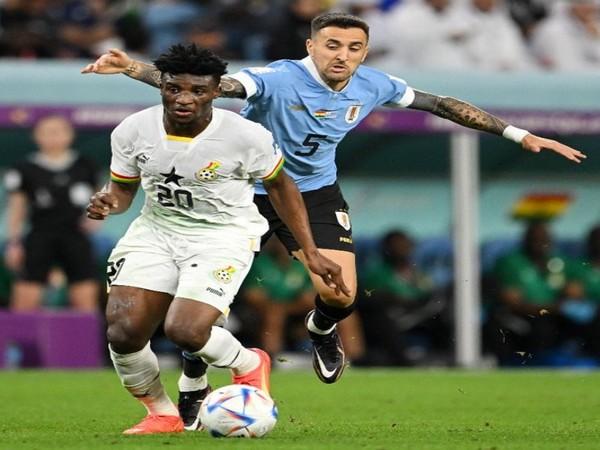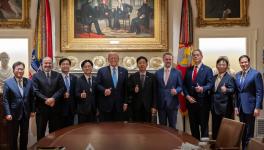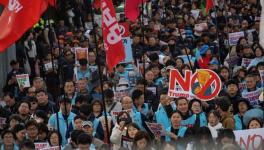Soccernomics in Ghana—Luis Suarez vs Mahamudu Bawumia as Enemy No.

Image Courtesy: FIFA World Cup Twitter
Politician Isaac Adango put Ghana’s Parliament on the world map on December 1. Taking a jibe at Manchester United and England footballer Harry Maguire—who’s having a terrible season for his club but has retained the confidence of England manager Gareth Southgate—Adango compared vice-president Mahamudu Bawumia’s stewardship of the nation’s economy to Maguire’s defensive disasters.
“Mr Speaker, when we gave this Maguire the opportunity to be at the centre of our defence, he became a risk of our own goal (sic),” Adango said in Parliament. “Dr. Bawumia, our economic Maguire, is now tackling all the fundamentals of our economy and destroying all of them.”
The assembled MPs burst into laughter. Of course, Adango was hardly joking. Ghana is in the throes of a debt and inflation spiral that has resulted in the currency losing more than 50% of its value this year alone. Inflation is more than 40% and fuel prices have gone up threefold.
As a way out, the government, its economic task force headed by Bawumia, is in the 17th round of negotiations with the International Monetary Fund for an additional $3 billion loan under an Extended Credit Facility. What Adango chose to ignore, as politicians do, was that Ghana stepped into the death trap of debt and neoliberal economic policy under the leadership of Jerry Rawlings and the centrist National Democratic Congress after the CIA-sponsored coup in which Kwame Nkrumah was overthrown.
In Qatar, the conversation was focussed more on football, not as a metaphor, but as sport. The villain of the piece was none other than the polarising figure of Luis Suarez, the Uruguayan striker described by one Ghanaian journalist as the “devil himself”.
Stepping into the press conference room at the Main Press Centre in Doha before the game, Suarez showed no regret over the events of 2010. Ghana then was inches away from becoming the first team from Africa to make it to the semi-finals of a men’s World Cup ever. That was until Suarez swatted away a strike off the goal line taking a red card and denying Ghana’s progress. Striker Asamoah Gyan then missed the penalty and Uruguay went through instead.
If anything, Suarez seemed surprised that people even remembered events from 12 years ago—ancient history as far as he is concerned. “I took the handball, but the Ghana player missed the penalty, not me,” he said on Thursday. “Maybe, I would apologise if I injured a player in a tackle and got sent off. But in this situation, I took the red card, and the referee said penalty. It’s not my responsibility to take the penalty. It’s not my fault.”
The logic isn’t flawed and, with the kind of all-encompassing emphasis on winning that Big Sport puts on athletes, Suarez is far from the only footballer to engage in this sort of gamesmanship. Gyan himself agrees; he has gone on record to say he might’ve done the same were the two to swap places.
In Ghana, though, they see it differently. And, Suarez has a pretty dodgy track record. Whether it is all the biting on the field (Otman Bakkal, Giorgio Chiellini, Branislav Ivanovic) or the racist abuse of Patrice Evra, the hate for Uruguay’s most-prolific striker is moral. That he followed up the handball in Johannesburg with a raucous, in-your-face celebration of Gyan’s miss, the sheer, unbridled joy at having knocked the Africans out of the competition made him a part of national history. And it is about more than just Ghana.
The World Cup reinforces the continent's inequity in every facet of life, as underlined by the COVID-19 pandemic. It has always been harder for African teams to get to the competition than anyone else.
For this year’s event, a total of 54 teams in Africa were competing to qualify for just five spots. For each of Africa’s allocated berths at the World Cup, there were 11 teams competing to make the cut. Contrast this with South America, where just two teams were fighting it out for each one of the region’s berths, and the massive gulf in World Cup opportunity becomes apparent.
One in every two CONMEBOL confederation members is competing in Qatar. This lack of opportunity majorly restricts the experience players get from playing in this sort of tournament format, which in turn becomes a detriment to progressing to the final rounds.
With all this at stake, it was only natural that Andre Ayew, the only member of the current squad who was also in South Africa, played down the revenge angle and told reporters in Qatar that qualifying, which also meant beating Suarez and Uruguay, was the only thing that mattered.
In the end, at the Al Janoub Stadium on the day, it wasn’t to be for Ghana. In an almost cruel repeat of history, the Black Stars had a penalty early on and the responsibility fell to Ayew. Whether it was nerves or the weight of history, Ayew was tentative in his run-up and took a weak left-footed effort that proved easy enough for Sergio Rochet to save.
Uruguay then upped their game and found two quick goals through Giorgian De Arrascaeta; the second was assisted superbly by Suarez. There was no revenge on the pitch for Ghana, but South Korea came to the rescue. Playing the other game in the group, the Koreans pulled off an unexpected 2–1 win over Cristiano Ronaldo’s Portugal to send Uruguay back home. The image of Suarez, probably at his final World Cup, weeping on the bench when all was said and done might not prove great joy for the people of Ghana, but it will, at least, lay the ghosts of 2010 to rest.
Get the latest reports & analysis with people's perspective on Protests, movements & deep analytical videos, discussions of the current affairs in your Telegram app. Subscribe to NewsClick's Telegram channel & get Real-Time updates on stories, as they get published on our website.
























